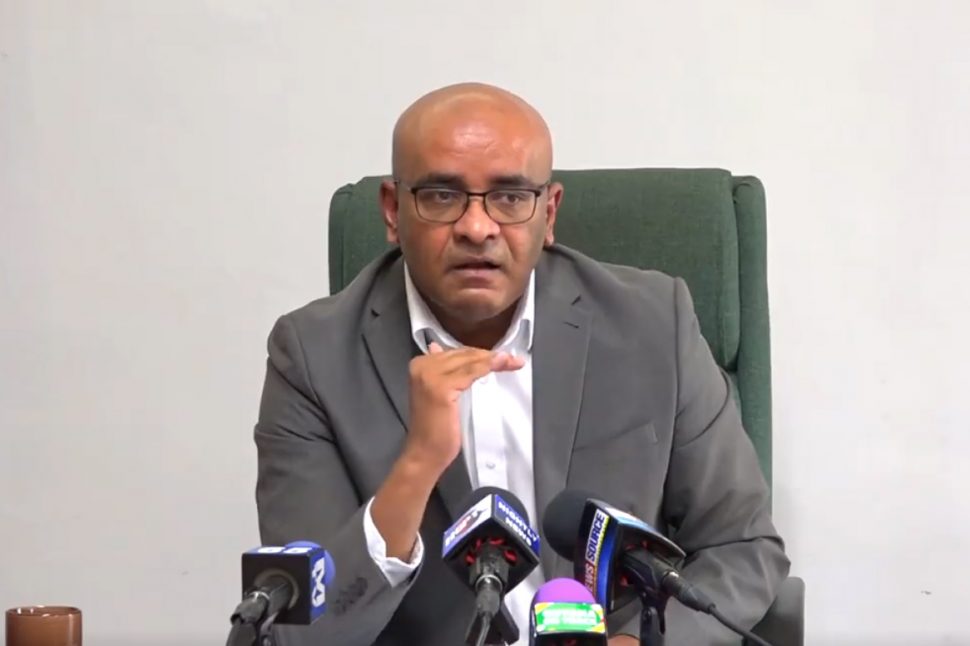The Office of Leader of the Opposition Bharrat Jagdeo yesterday accused President David Granger of acting in bad faith on the holding of constitutionally-due elections, while maintaining that government cannot continue holding office beyond the March 21st deadline unless an extension is granted by two-thirds of the elected members of the National Assembly.
“The President talks about ‘collaboration’ but has not acted in good faith when engaging the Parliamentary Opposition,” Jagdeo’s office said in a statement issued in response to an address to the nation by Granger in the late afternoon.
In his address, the President said the resolution of the “present political challenges requires collaboration” and assured that he was prepared to do his part to ensure “credible elections” within “the shortest time possible” this year.
While Granger also emphasised the need at this time “for political cooperation, not confrontation,” Jagdeo’s office said it was clear from its actions the holding of general and regional elections is not of paramount importance for the Granger-led government.
The statement from Jagdeo’s office maintained that President Granger “abdicated his responsibility” to name a date for the polls and instead insists that the Guyana Elections Commission (GECOM) must determine an elections date, although it is subservient to the Constitution.
Jagdeo’s PPP/C has been pushing for polls since the passage on December 21st of a motion of no-confidence against the government in the National Assembly, following the surprise vote in its favour by then government parliamentarian Charrandass Persaud.
The statement said that while President Granger insisted in his address that his government has respected the judiciary, it continues to disregard the acting Chief Justice Roxane George-Wiltshire’s ruling that “Cabinet must be taken to have resigned with immediate effect from the evening of December 21, 2018, and all functions or duties provided in any law to be performed specifically by Cabinet must have ceased from that time.”
It further said the judge also ruled that the President and the Ministers cannot remain in government beyond the three months within which elections are required to be held in accordance with Article 106(7), “unless that time is enlarged by the National Assembly in accordance with the requirements of said Article 106 Sub Article 7.”
“Therefore, the President’s claim that his government “continues to comply” with the ruling of the Chief Justice (ag) is another fallacy,” the statement added.
According to the statement, while the President uses Article 106 (7) as grounds to claim that he and his Ministers “remain in office” constitutionally, he fails to admit that the Explanatory Memorandum of the amendment bill for its enactment said: “Clause 5 alters Article 106 to provide for the resignation of Cabinet and the President following the defeat of the Government in the National Assembly on a vote of confidence. Although defeated the Government shall remain in office FOR THE PURPOSE OF HOLDING AN ELECTION.”
“To claim that “the Constitution contemplates continuity of the Government” is yet another fiction being peddled by Granger. Therefore, if – as the President claims – the Government “is conducting its affairs in accordance with the Constitution” of Guyana, we would not be on the precipice of a constitutional crisis,” it added
Jagdeo’s office stressed that the life of the government can only be extended by a two-thirds vote in the National Assembly. “If there is no such vote, the life of the Government ends; the maximum timeline set by the Constitution (three months after the passage of the no confidence motion) will have expired. The clock has been ticking since December 21, 2018, and there has been no stay of that timeline by the Court,” it said. “After March 21, the APNU+AFC Coalition Government becomes unconstitutional, illegitimate and illegal. Sole responsibility for the impending constitutional crisis rests with President Granger and his government.”
Jagdeo’s office also took issue with the President’s claim that he has urged the “readiness” of GECOM to conduct “credible elections at the earliest possible time,” saying it is contrary to the actions of Coalition-nominated GECOM Commissioners, who have been insisting on national house-to-house registration, which would delay elections until 2020.
“For the President to claim that he is acting responsibly, not recklessly, because he did not receive “guidance” from GECOM to allow him to proclaim a date for Elections – having met with GECOM on March 8, 2019 – is another fiction, as that meeting largely focused on national House-to-House Registration. It must be noted, that at the very March 8, 2019 meeting, the President rejected a work plan from the Opposition-nominated GECOM Commissioners, which contemplated the holding of General and Regional Elections on April 29, 2019. The President has insisted that he is waiting on GECOM to be ready, while his own Commissioner, Vincent Alexander, has said that GECOM is waiting on the President to name a date before it can begin to ready itself for Elections,” the statement added.
It charged that the President’s comments on GECOM underscored the “duplicity” with which he continues to act on this issue, noting that while he claims that GECOM is “insulated from political interference,” he violated the balance of GECOM by unilaterally appointing the Chairman, thereby transforming it into “a partisan body” that dances to the tune of the government.
Jagdeo’s office also accused Granger of misleading the nation as it relates to funding for GECOM. It noted that while the President says GECOM may need additional “resources” for the conduct of the polls, the Fiscal Management and Accountability (FMAA) (Amendment) Act of 2015 makes it clear that GECOM can use sums from its $5.731 billion budgetary appropriation to conduct elections.
It was further argued that Article 222A of the Constitution and the comments of Finance Minister Winston Jordan, who said during the consideration of the budget estimates that the sum of $5.371 billion was given as a lump sum to GECOM to use “as it sees fit and as it prioritizes,” also prove that it could use its available resources.






